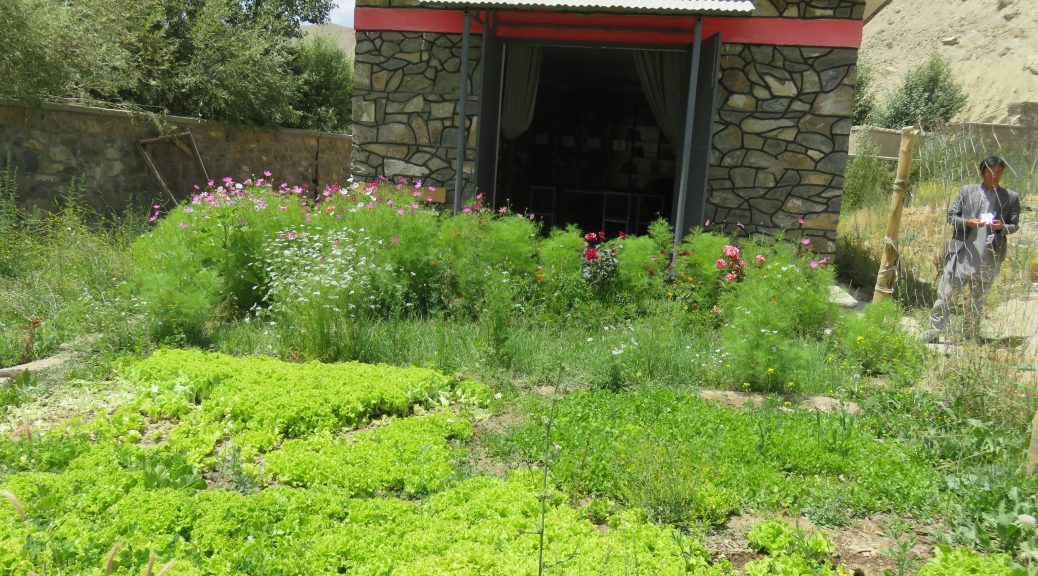Improve nutritional status by promoting gardening
Although attention is focused on the country’s political and security transitions, malnutrition is a major concern in Afghanistan. Because the lack of adequate nutrition has crucial long-term effects on individuals and on the social and economic development, nutritional status deserves attention and appropriate action.
A national survey, conducted jointly by the Ministry of Public Health, UNICEF and the Aga Khan University [1], provides an overview of the nutritional status of women, children, adolescents and the elderly. In particular, it shows that the country has one of the highest stunting rates in the world, with 41% of children under five affected. Stunting is a sign of chronic undernutrition during the most critical periods of growth. Stunted growth prevents children from reaching their potential; affected children are more likely to develop diseases and have less success in school.
Chronic nutritional deficiency in Afghanistan is largely the result of poor nutrition. Inadequate dietary diversity and insufficient amounts of food, combined with poor hygiene, represent health risks and are a cause of mortality in older children. When mothers have an inadequate diet, a vicious cycle is created; malnourished infants grow up to become stunted mothers, generation after generation.
Nai Qala’s projects as a gateway to other nutrition-related actions
Poor feeding practices are common in Afghanistan and are not only a result of poverty, but also the result of the families’ limited knowledge or the way social norms influence decisions. Staff at the Nawur clinic are trained to help women acquire the knowledge and information they need to adopt healthy eating habits.
Early childhood education classes are also a means of transmitting health-related prevention messages, such as teaching children to wash their hands before eating together.
Several types of actions can be taken to address some of the causes of malnutrition. The community infrastructures built by Nai Qala represent a tremendous platform for communicating positive health prevention messages.
Carrot plantations in the surroundings of the Nawur clinic
The benefits of vitamin A no longer need to be proven; it prevents blindness and strengthens the immune system, especially in children. Carrots, apricots, spinach, or eggs are foods that are a source of vitamin A and are part of a healthy and diversified diet for children in many parts of the world. Unfortunately, even the least varied diets are still out of reach for more than two thirds of infants and young children in low-income countries and remote parts of central Afghanistan are no exception.
To increase children’s chances of survival, improve their development and prevent stunting, nutritional interventions must be implemented during the mother’s pregnancy and the early years of the child’s life. In Afghanistan, it is estimated that more than 80% of children receive vitamin A supplements in their first two years of life [2], and young children around the Nawur clinic benefit from national supplementation campaigns. Young mothers and the population benefiting from the clinic also receive gardening advice and vegetable seeds. This has led to a multiplication of carrot plants in the allotment gardens of the region, an important source of vitamin A for young and old.
School Gardening Competition
The Zeera Gag school, built a few years ago by the Nai Qala Association, is now one of the few green spaces in the region and is a source of inspiration for an entire population. Each class participates in a gardening competition. Children grow vegetables and fruit trees, ensure that they are well irrigated and take care of the land allocated to them. The children are happy that their school has such a green and clean environment, and are also very proud to see the result of their hard work. It is incredible to see how the culture and interest in food has changed. Children encourage their parents to grow vegetables at home too.
“Five of my children go to Zeera Gag school. Since they started school, my life has changed: they come home clean, rarely get sick, and are very motivated to plant vegetables and trees at home. Now we have a lot of vegetables in our garden, our diet has changed and we are used to eating more varied foods, I see my children happy, it makes us happy… ” says Zahra, mother of 7 children.
Gardening as a solution to malnutrition?
The results of a UKAid-funded study [3] show that ownership of irrigated land and garden plots is positively associated with household food diversity.
The FAO and WHO recommendations emphasize the benefits of food diversification in combating many nutrition-related diseases. Food diversity is used to assess food quality and food security. The vegetable garden is a practical addition to improve the nutritional content of the food and, ultimately, to improve the health of local populations. The presence of community infrastructure or the small actions of Nai Qala that encourage community gardening are a concrete contribution to improving the health status of local populations.
[1] National Nutrition Survey Afghanistan (2013): https://reliefweb.int/sites/reliefweb.int/files/resources/Report%20NNS%20Afghanistan%202013%20%28July%2026-14%29.pdf
[2] https://data.unicef.org/topic/nutrition/vitamin-a-deficiency/
[3] Kawsary, R., Zanello, G. and Shankar, B. (2018) The Role of Irrigation in Enabling Dietary Diversity in Afghanistan, LANSA Working Papers Vol 2018 No 26, IDS: Brighton


